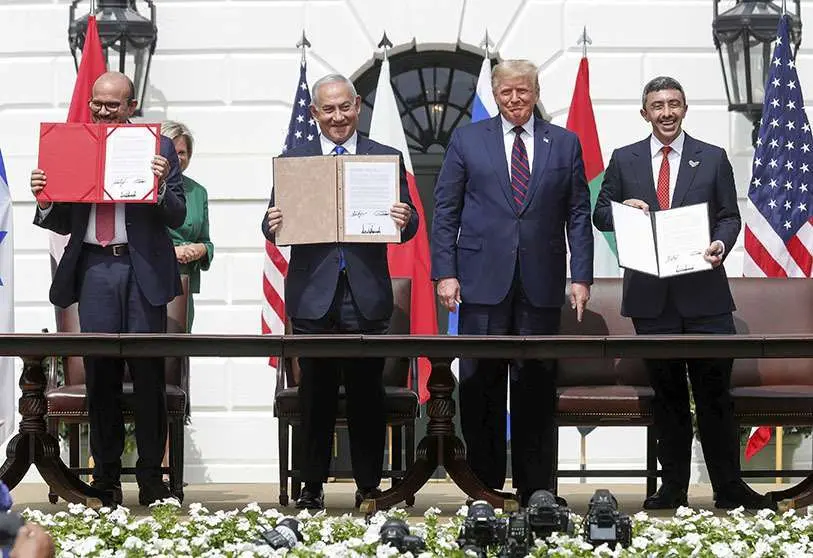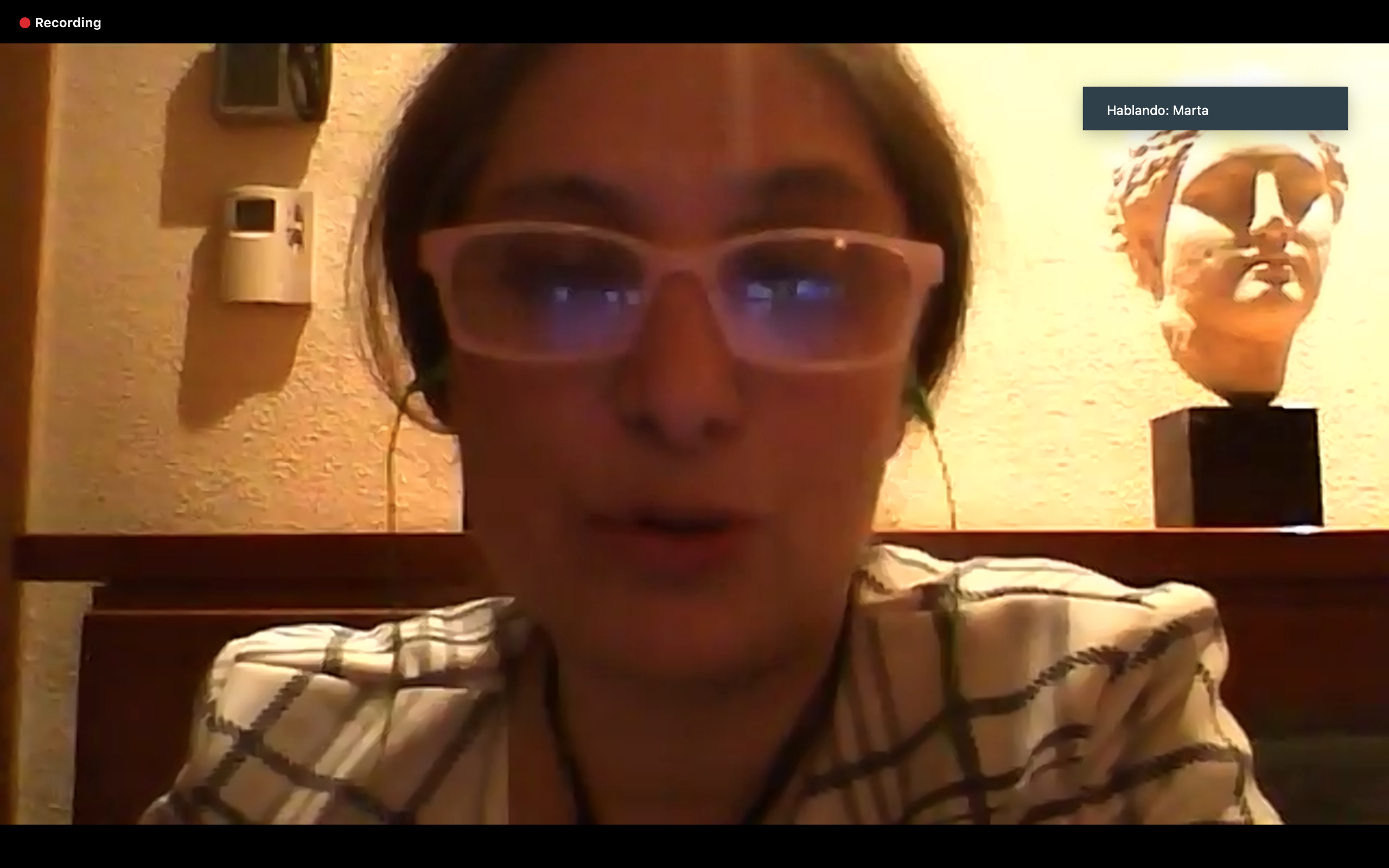Los Acuerdos de Abraham, una esperanza para la paz en Oriente Medio

On 13 August 2020, former US President Donald Trump announced that the United Arab Emirates and Israel had reached a normalisation agreement. At the same time, the Sudanese government's foreign affairs spokesman, General Abdel Fattah Abdelrahman, confirmed that they were in advanced talks with the Jewish state, and given the history of open hostility between Israel and Sudan, this development is unprecedented in history.
Almost a month later, on 11 September, Bahrain announced that it had reached a particular agreement with Israel. On 13 September, the signing ceremony of the Abraham Accords took place in Washington D.C. The Abraham Accords will go down in history as one of the most important events in foreign relations in recent years. From a political point of view, they represent a "spur" for Israel and a boost for peace in the Middle East.
The webinar 'The Abraham Accords: an analysis of Israel's current and future situation in the region', organised by the Campus 30 project, featured the intervention of Marta González, journalist and political analyst and expert in the prevention and management of international conflicts. Throughout the event, the position of Israel in the new geostrategic framework of the Middle East promoted by the Abraham Accords was presented.
In the journalist's words, in the diplomatic sphere, "these agreements are the most brilliant operation that has ever taken place through American mediation". The Trump Administration, beyond the political gain for re-election, sought to "take advantage of the dynamics that already exist in the region and instil a strategic vision that will rebalance and curb Iran's expansionist aspirations, as well as its nuclear capability and the expansion of China and Russia in the region".
It is also important to underline the establishment of a new pattern of thinking among Arab countries that will take the Palestinian cause out of the equation of peace agreements. So far only two countries, Egypt and Jordan, have diplomatic relations with Israel. "We cannot speak in either case of peace agreements, but rather of a normalisation, a cold normalisation", Marta points out. Until the arrival of the Abraham Accords, Arab countries continue to consider Israel as "a colonialist graft that is embedded in the very heart of the lands of Islam".

Through the Abraham Accords, the hope is to go a step further, not only to establish an agreement among the elites, but to reach all layers of society and to implement it through culture, education and thus change the population's view of Israel.
According to the journalist, Israel's relations with the Arab and Muslim world in general "have pivoted towards two polar situations: instability or a precarious peace". The last decades, coinciding with the decline of the US position in the region and disillusionment after the euphoria of the Arab Spring, have prompted the search for a real settlement between Israel. This need has had an impact on the struggle for the Palestinian cause, which has been replaced by a logic of more modest and more pragmatic agreements that have been woven in the shadows.
In the case of the Gulf countries, a number of elements converged to bring about the inevitable rapprochement with the Jewish state. On the one hand, the fall in oil prices and the realisation that energy resources are dwindling. They also saw the need to diversify their economies, to which must be added the need for security due to the threat they feel they share in the face of Iranian expansionism. Finally, the interest of the different Gulf countries in Israel's technological capabilities in terms of renewable energies and sustainable water development, among others.
Marta affirms that these agreements "open up the possibility and lay the foundations for future agreements, such as framework treaties, for the establishment of future relations with other countries".
Morocco
Morocco had already established diplomatic relations with Israel, but on three occasions it withdrew its diplomats from Tel Aviv, the last time in 2014. This new normalisation of relations with the Jewish State was planned for 2021, but it is being accelerated for two reasons, Marta points out: "in November the Polisario Front broke the peace agreement it had signed with Morocco and, on the other hand, Trump lost the elections, so this is the last trump card left to the Alaouite kingdom".
In Morocco there is a very important Jewish community, so the ties between Israel and the Moroccan kingdom are old but buried. "The Moroccan public does not welcome the re-establishment of relations with Israel until the Palestinian cause has been closed," she explains.

The former US president, for his part, is making a fundamental move: recognising the sovereignty of Western Sahara, a territory that for legal purposes is under Spanish administration. Western Sahara is a strategic enclave, not only in terms of fishing, but also because it is an area rich in minerals and phosphates "whose exploitation Morocco has long yearned for".
The journalist pointed out in the webinar that this situation affects Spain, as Morocco's strategy is increasingly clear with respect to this territory. "Morocco has directly maintained its interest in recovering the Canary Islands, Ceuta and Melilla over the last few decades. Its strategy with regard to the autonomous cities consists of economic strangulation of the area, while on the islands it has encouraged human smuggling, forcing Spain's decision to give in or reach an agreement that in some way benefits it in the Sahara conflict".
The decisions taken by Biden in his first few days "suggest that he is going to return to multilateralism as a foreign policy formula". The journalist points out that she does not foresee major changes in terms of the policies employed in the Middle East.
"The main change will perhaps be a return to the nuclear deal. "If the nuclear agreement is reinstated, Iran will be emboldened in the region", Marta predicted. Even so, there is a new power that can influence the region, and that is China, which has strong relations with Iran. "The Asian giant could be an element of balance in a region that is becoming polarised and divided into two antagonistic visions. But over time, if there is an incentive that Iran understands is positive enough, it could cease to be a threat."








